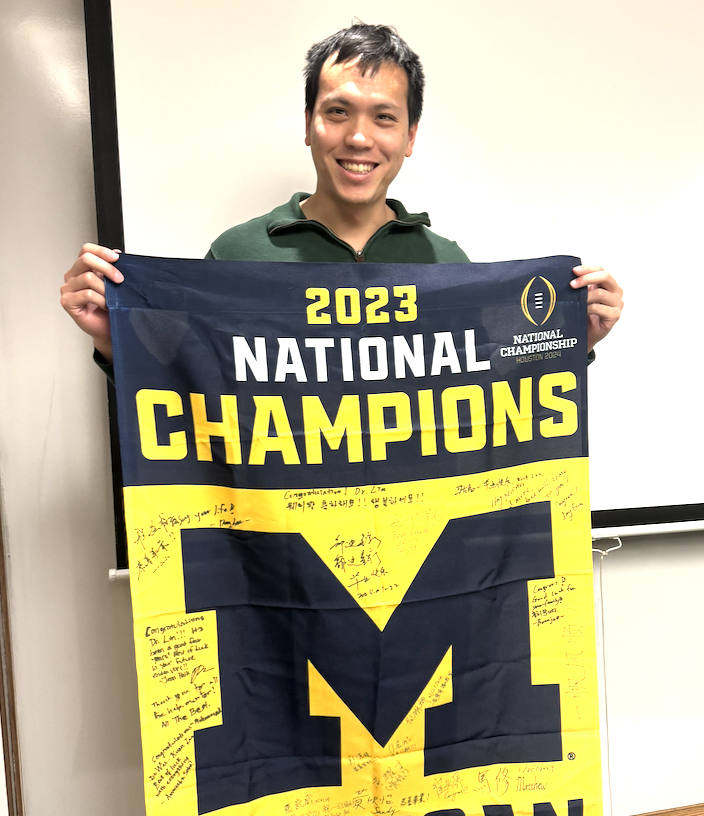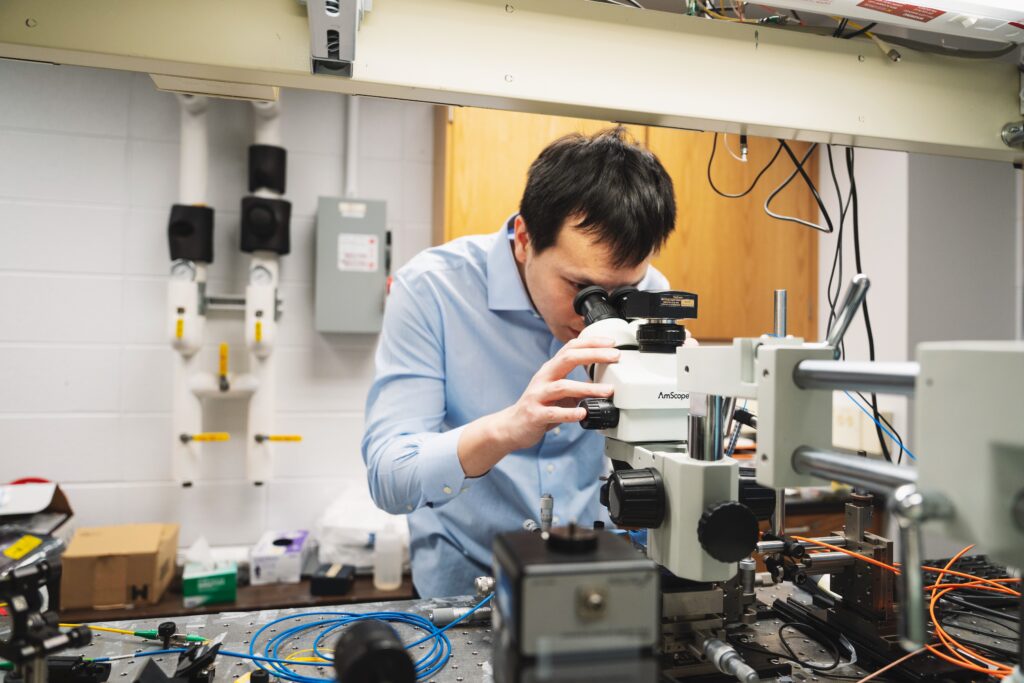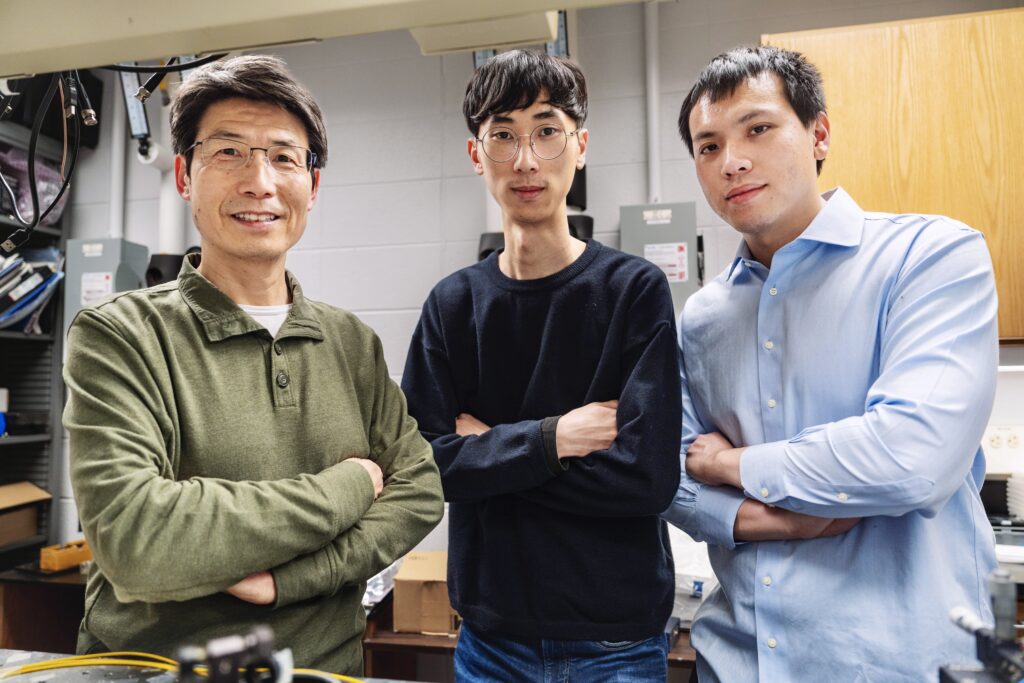The power of a “can do” spirit: Wei-Kuan Lin’s journey to success

Wei-Kuan Lin (PhD ECE 2024) works as a process engineer at Intel, a position he began shortly after successfully defending his PhD dissertation in Electrical and Computer Engineering (ECE) at the University of Michigan. The last photo of him at his research group meeting captures him smiling widely, holding a University of Michigan flag signed by his close community of friends and colleagues.
Looking at these accomplishments, it would be hard to guess that, just years before, Lin felt alone and helpless. From 2022 to 2024, he transformed from worried and timid to confident and optimistic.
“The journey of my PhD has been one of the most significant periods of my life.” Lin wrote in his dissertation acknowledgements. “I am confident that I am not the same person as the one who came seven years ago.”
Lin came to Michigan ECE to pursue his PhD in 2017, on the advice of some Taiwanese friends who found it to be a friendly and supportive environment. However, after some time, Lin felt a mismatch with his research advisor, and considered a change.
Like many graduate students, Lin was reluctant to reach out for help, concerned that he was alone in his challenges—although over 20% of doctoral students nationally consider leaving their programs due to mismatches with faculty advisors.
Everyone wants you to succeed.
Wei-Kuan Lin
In 2020, after much introspection during the COVID-19 pandemic shutdown, he finally worked up the courage to leave his research group—even before securing a new research advisor. On the advice of former department chair Mingyan Liu, he emailed his resumé to about 10 professors.
Several of the professors sent Lin encouraging feedback, letting him know that he was understood and appreciated. One professor in the Chemistry department even took the time to meet with Lin, assuring him, “I understand your situation and really admire your determination. I am sure you will find a solution, because everyone wants you to be successful.”
This seemingly simple expression of support from an unfamiliar professor inspired Lin to continue searching for a lab group to continue his PhD, at a time when he was close to giving up. On a Sunday afternoon in the summer of 2020, Lin had his first meeting with ECE Prof. L. Jay Guo. He was struck by Guo’s willingness to take time out of his busy schedule, his humble demeanor, and his offers of compliments and opportunities. Lin gratefully accepted Guo’s offer to join his research group, working on nanofabrication projects.
Initially, Lin worried that he might not have enough specialized experience to succeed in Guo’s research group, but with Guo’s mentorship, he began to gain confidence and thrive. For the remainder of his PhD, he worked on using optical resonators for ultrasound sensing, with applications in medical imaging.

A once shy and reserved student, Lin was happy to discuss his work in Guo’s research group. “This is really exciting and interdisciplinary work that can directly benefit humans and save lives by simplifying cancer diagnostics.” he explained. “The optical resonators and fabrication method that we developed also provide a new route for making highly sensitive ultrasound detectors, which we expect to be widely used in the near future.”
Guo urges that faculty should encompass proactive support of students who are experiencing adverse circumstances, rather than leaving them behind.
It’s important to always have a ‘can do’ spirit to find solutions to potential problems.
L. Jay Guo
“These students could easily drop out of our PhD program, but they are all good people with strong desires and skills.” he said. “It would be a waste of our resources and their previous time if they left the program for reasons other than research ability and aptitude.”
Lin credits Guo’s mentorship for enabling his transformation from worried to optimistic. Guo’s willingness to offer praise, help troubleshoot problems, and show compassion to his students allowed Lin the space to grow professionally.
Lin recalls a time when he was having some difficulties with nanoimprinting. His project wasn’t going well and he was very concerned about his progress.
Instead of simply telling him to work harder on the experiments, Guo told him, “I think that you should remove the word ‘worry’ from your vocabulary until you graduate. It’s important to always have a ‘can do’ spirit to find solutions to potential problems.”
After this lesson, Lin adjusted his mindset and tried to appreciate everything he encountered, even the challenges. He found this mentality helpful and he began to make progress in his research again.
“I would like to show my utmost gratitude to my advisor, Prof. L. Jay Guo, who totally changed the experience of my PhD life.” he concluded in his dissertation acknowledgements.
Guo also appreciated Lin’s hard work and dedication. “How could one believe the hardship and tough journey behind such a sunshine smile? I am so proud of him!”

Now that he has graduated with his PhD, Lin wants to let future students know that they shouldn’t put off asking for help if they are struggling. “I’ve talked to some students who are very hesitant to change labs. They are concerned about the consequences.”
To these students, Lin wants to say, “You probably don’t need to have this kind of mindset. Everyone wants you to succeed.”
Additional Information
Resources for faculty and students navigating advisor-advisee relationships in graduate school
Resources for international students navigating their degrees and adjustment to U.S. culture
Mental health resources for University of Michigan students
 MENU
MENU 
